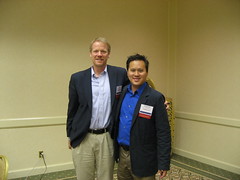I’m sitting next to Jeremiah at this Frost & Sullivan interactive session, which is being led by Patricia Hursh of SmartSearch Marketing. It’s on “Balancing Paid and Organic Search.” She promises the following key takeaways:
- SEO vs. PPC decision criteria
- Compelling reasons to integrate/implement both methods
- How to isolate and measure results
- Tips on maximizing your ROI
Craig Oldham from Allstate is one of the thought leaders for this discussion, too; she’s joined by Carrie at GMAC Mortgage.

Jeremiah is blogging the presentation, too, and his thoughts are here.
The key point is it’s not really SEO vs. PPC, but SEO and PPC. SEO is a lot like PR, whereas PPC is marketing. Just as you don’t have final control of the message with PR, you don’t with SEO either. But organic search results and media stories have higher credibility – and costs are less.
Most businesses wouldn’t pit PR and marketing against each other, and only do one or the other. The same point holds for search engine marketing and Pay Per Click.
SEO vs. PPC decision criteria include budget, speed to results, control over message, flexibility, longevity, credibility and competitiveness of your market. SEO doesn’t require a media budget for each click, but it’s not free. Speed to results is a big advantage for PPC, whereas natural search can take longer. PPC gives more control and flexibility, while longevity and credibility is better for organic. And depending on the competitiveness of a market and the number of bidders for a given search term, PPC can vary widely in cost per click.
Offering real value on your site is important to get people to link to you. The number of real links is what drives search engine results, and the way to get links is to offer value. In the end, that’s what drives links. If your content is worthwhile, people will link to it.
Google has webmaster tools that let you submit a site map during site redesign, so you don’t lose ranking. That way the spidering happens more quickly and efficiently. Optimizing press releases also helps speed the SEO process.
Compelling reasons to integrate/implement both methods – with PPC you can control the exact message, but some people have a much higher propensity to click organic results, distrusting the ads. And why wouldn’t you do the relatively cheaper thing, SEO, if you’re doing PPC?
Sites that require customer logins hurt their search engine rankings because the crawlers can’t get there, so Patricia asks her clients to decide which pages really need to be behind the password-protected area, and which ones are available to the world (and the search engines.)
Ability to turn on quickly is an advantage of PPC; you can take advantage of current events or mass media appearances (as Sheila from Siemens mentioned about an Oprah appearance by her company.) Optimized press releases also can do this quickly. You also can buy terms for competitors or adversaries on a key issue.
(As an aside, I need to check out a service Jeremiah mentioned, which uses a USB device to get wireless internet access via cell phone. He’s got a cool card that lets him liveblog this session and do multiple posts; I have to go somewhere to connect to wifi between sessions. He mentioned that Thomas Hawk has a device he uses for his Mac. This would be really good for me to have wireless access on the bus each day. If anyone can tell me what that service or device is, I want to buy it.)
Patrick from Outrider mentioned PPC as a message tester, so you can see what words or phrases people actually click. “Search is a fabulous focus group,” Patricia says. Jeremiah says looking at tags in del.icio.us is a good way of seeing what attributes consumers are applying to your web site.
Tips on maximizing your ROI – we discussed that if your organic search is good, you can possibly pay less for 4th or 5th position in PPC, and get good results at lower advertising costs.
Thanks, Patricia, for a great job in facilitating, and going where the participants were interested.
 Technorati: SEO, SEM, Search Engine Marketing, PPC, Pay per click, Frost & Sullivan, Google, liveblog
Technorati: SEO, SEM, Search Engine Marketing, PPC, Pay per click, Frost & Sullivan, Google, liveblog
i think that both methods are important
Thank you for sharing your techniques.. very talented website.. Keep up good work!http://zobibiseo.harenatv.com